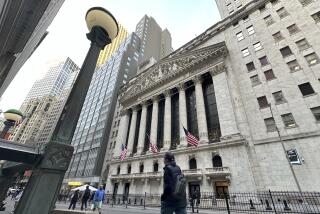U.S. holds up better than most as world markets sink
America: better than a lot of the alternatives.
That sentiment seems to be guiding many investors this month, as world markets are rocked again by Europe’s debt crisis and by fears of slowing global economic growth.
Although U.S. stocks have sold off in May, their losses overall have been less severe than the declines in many other equity markets.
What’s more, investors continue to park cash in U.S. Treasury bonds, pushing interest rates lower. And the dollar, the weakling of world currencies for most of the last nine months, now is muscling its way higher.
U.S. assets “are a haven again,” said Jeff Schappe, who oversees $32 billion as chief investment officer at Sterling Capital Management in Raleigh, N.C.
On Monday, the Dow Jones industrial average fell 130.78 points, or 1.1%, to 12,381.26. But that was modest compared with losses of 2% to 3.6% in many foreign markets.
European stocks plunged after Standard & Poor’s warned over the weekend that it may downgrade Italy’s credit rating. Also, Spain’s ruling party suffered a major defeat in national elections, raising fresh concerns about the country’s fiscal health.
Although the focus in Europe this year has mostly been on the heavy government debt burdens of Greece, Ireland and Portugal — all three of which have been bailed out by the European Union — Italy and Spain are far larger economies. Any thought that they too would need debt bailouts strikes terror in markets.
Investors pushed up market yields on Spanish and Italian government bonds Monday, reflecting new worries about the countries’ finances. The annualized yield on two-year Spanish government bonds rose to 3.70%, up from 3.36% a week ago.
But Greece remains at greatest risk of a meltdown, analysts said. The government is trying to accelerate austerity measures to pare its budget deficit, but investors are treating the country’s bonds as if some form of default is inevitable.
The yield on two-year Greek bonds reached a record 26.3% on Monday, up from 25.5% on Friday.
With rising expectations that Greece will be unable to pay private bondholders in full despite previous help from the European Union, “Europe’s failing approach to its debt crisis has renewed fears of a contagious sovereign default and a possible euro zone breakup,” said Lena Komileva, a currency strategist at Brown Bros. Harriman in London.
The euro fell to $1.404 on Monday, down from $1.416 on Friday. Just three weeks ago the euro was at $1.48, its highest since late 2009.
Stocks fell sharply across Europe. The Italian market plummeted 3.3% to its lowest since mid-January. Shares fell 2% in Germany, 2.1% in France and 1.9% in Britain.
Markets also slumped in Asia overnight after a survey of manufacturing activity in China pointed to a further slowdown in May. The Shanghai stock index tumbled 2.9% to its lowest level since early February.
China and other emerging markets have been tightening credit this year, trying to dampen inflation by slowing growth. But those efforts have triggered selling in emerging-market stocks as investors fear the anti-inflation moves may go too far.
The Shanghai market now has fallen 9.2% from its 2011 high in mid-April. In Brazil, which also is tightening credit, stocks are down 10.7% from recent highs.
By contrast, the U.S. Dow index is down 3.4% from its multiyear high April 29. The average New York Stock Exchange stock fell 1.4% on Monday and is down 5% from the market’s late-April peak.
Market bears point to increasing evidence that U.S. economic growth also is slowing, and warn that Wall Street may just be the last domino to fall as investors retrench. Bulls see just a temporary “soft patch” for domestic growth.
“I think it’s a little early to be throwing in the towel” on the U.S. recovery, said Bruce McCain, chief investment strategist at Key Private Bank in Cleveland. Weakness in manufacturing, he said, has partly stemmed from supply-chain interruptions in the wake of Japan’s March earthquake. He also expects falling gasoline prices to help buttress consumer spending.
And despite America’s own debt problems, Treasury bond yields continue to drop as cash moves in. The 10-year T-note, a benchmark for mortgage rates, fell to 3.13% on Monday, down from 3.15% on Friday and near last week’s 2011 low of 3.12%.
The slide in yields has confounded investors who expected Treasury rates to move up as the Federal Reserve gets ready to complete its $600-billion Treasury bond-buying program June 30. Sterling’s Schappe said falling yields reflect investors’ belief that Fed policy “is going to remain easy for some time,” even though the bond program will end.






